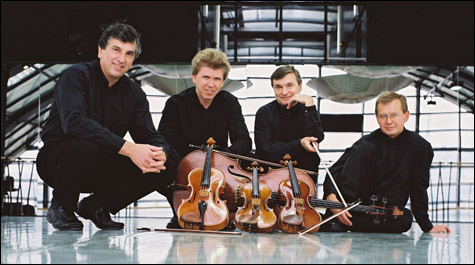
The Prazak Quartet
|
The BSO has been having terrible luck hanging on to its star soloists. Pianist Martha Argerich cancelled her engagement earlier this month, and then an unspecified illness forced glamorous Metropolitan Opera soprano Karita Mattila to bow out of Beethoven’s Fidelio. Not for the first time, the BSO turned to soprano Christine Brewer (in January 2006, without benefit of rehearsal, she replaced Deborah Voigt in Beethoven’s Missa solemnis). Rescue is certainly the operative word: Leonore, Beethoven’s heroine, disguises herself as a man (named Fidelio — the faithful one) in order to release her husband, Florestan, who’s being held as a political prisoner. It’s one of the most demanding soprano roles in opera.
Then before the first performance, orchestra manager Ray Wellbaum announced that Brewer was fighting a cold. If you were listening for signs of strain, you might have detected a few in Brewer’s highest and loudest notes — though it’s a rare soprano who sounds effortless under ideal conditions. Brewer has a brightly focused, heroic voice and passion in her delivery. Her spoken dialogue sounded both understated and believable. Her Florestan, South African tenor Johan Botha, has a thrilling clarion voice, though without much variety of timbre. Florestan has been captive for two years and is on the verge of dementia and starvation. In Sarah Caldwell’s 1976 production, Jon Vickers managed to suggest these qualities and yet still fill the hall. He tore your heart out. Botha sounded awfully healthy for a character in such dire circumstances. Still, the orchestra (after a somewhat rough start), the magnificent Tanglewood Festival Chorus, and Levine’s understanding of how Beethoven’s essentially symphonic structure is the underlying source of drama (the extended celebratory finale contains the glorious insistence of the Fifth and Ninth Symphonies combined) kept me riveted, finally sweeping me away with the sincerity of its optimism that good really can triumph over evil.
Beethoven revised his only opera twice over a period of nine years after its 1805 premiere. You can hear him moving from Mozartian comedy (with echoes of Figaro, Don Giovanni, and Zauberflöte) to echt Beethoven. In the comedy, Jaquino, the prison gatekeeper (sung to perfection by the elegant Met tenor Matthew Polenzani), is hopelessly in love with the jailkeeper’s daughter (pretty-voiced Scottish soprano Lisa Milne), who has fallen for “Fidelio.” Warmly resonant bass Robert Lloyd was the tender-hearted jailkeeper; bass-baritone Albert Dohmen (Bartók’s Bluebeard with the BSO last fall) the villainous Don Pizarro; James Morris the right-minded deus ex machina, Don Fernando; and in two superb cameos, as prisoners, we got Boston favorites tenor William Hite and baritone Robert Honeysucker.
The brief but intense Nor’easter two weekends back was bad news not only for the music groups that lost revenue but for the music-going public forced to miss a couple of the best concerts of the season. At the BSO, the week before Fidelio, James Levine returned with a reprise of Mahler’s overwhelming Third Symphony, which he last played with the BSO in 2001, seven months before 9/11 and nine months before he was named music director.
His essential conception remains unchanged. He focused on the symphony’s thistledown buoyancy and exuberant/alarming volatility, the way both within and among movements Mahler’s vision of the world, of the cosmos, keeps evolving from primal awe (a mixture of celebration and fear of the natural world) into a vision of spiritual transcendence. In this rare symphony that ends with a slow movement, Levine lets that music (marked “Slow. Peaceful. Deeply felt.”) unfold inch by inch, much more slowly than most conductors. But he never loses the thread, the underlying pulse. Opening night, the performance ran 15 minutes longer than the conclusion time listed in the program, but it never dragged.
You’d have to go back 28 years, to Claudio Abbado’s stirring version of Mahler’s Symphony No. 2 with the BSO, for the same kind of uplifting, wall-shaking communal experience. Although I continue to be moved by the interpretation, I was even more moved by the beautiful playing — from the very first bars. That opening horn call (James Sommerville), such a danger zone for horn players, was both grand and embracing. James Ferrillo’s oboe sang of yearning. Elizabeth Rowe’s flute seemed to embody spiritual purity. Concertmaster Malcolm Lowe’s violin offered serene consolation. And Thomas Rolfs, playing the off-stage third-movement posthorn solo with such clear, steady, and soulful tone, seemed to be delivering a message from another world.
In the “Misterioso” fourth movement, the mezzo-soprano sings Nietzsche’s poem warning us to pay attention, reminding us that deep as pain is, joy is even deeper. In 2001, the singer was Lorraine Hunt Lieberson, and I don’t think I’ll ever hear a deeper performance. I didn’t ever want to hear anyone else. But Stephanie Blythe, with her voice more bronze than gold, her pinpoint accuracy and musical urgency, with the added warmth of Lowe’s violin and Robert Sheena’s English horn and Ferrillo’s stabbing oboe outcry, made me glad to hear her. The women of the Tanglewood Festival Chorus and the American Boychoir chiming like angels (and singing from memory) made memorable, heavenly contributions.